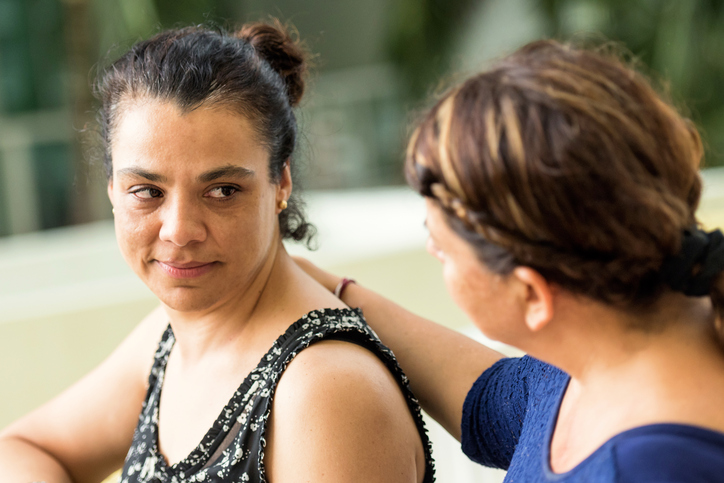 Though sexual abuse is a traumatic and life-altering experience, recovery is possible. A compassionate therapist can often help those who have experienced rape and other forms of sexual abuse. Self-care and social support can also be vital to recovery.
Though sexual abuse is a traumatic and life-altering experience, recovery is possible. A compassionate therapist can often help those who have experienced rape and other forms of sexual abuse. Self-care and social support can also be vital to recovery.
- Therapy for Sexual Assault and Abuse
- Self-Care After Sexual Assault
- How to Support a Survivor
- Case Examples of Therapy for Sexual Abuse
- Getting Help after Sexual Assault
Therapy for Sexual Assault and Abuse
There are many types of therapy which can treat sexual abuse survivors. A therapist can assess a person’s situation and determine which treatments are most appropriate. In some cases, a therapist may use a combination of strategies.
The following therapeutic approaches are commonly used in treating sexual abuse:
- Depth therapy focuses on a person's unconscious thoughts, feelings, and memories. In therapy, a person can learn how their unconscious emotions affects conscious behaviors. As self-awareness increases, a person can learn to recognize and change problematic behaviors.
- Eye movement desensitization and reprocessing therapy (EMDR) uses subtle eye movements to help “rewire” the brain. EMDR can change the way the survivor processes the memory of the abuse. This way, the memory feels less present and threatening.
- Cognitive behavioral therapy (CBT) can teach survivors to abandon dysfunctional thinking patterns and behaviors. In therapy, survivors may work on reducing anxiety through mindfulness exercises.
- Play therapy can help young children who have encountered sexual abuse. Young children may not understand what happened or be able to articulate their feelings. Play therapy can help children express their emotions and help them process difficult memories.
- Sex therapy can help adults who may have intimacy issues after recovering from sexual abuse. It is not recommended for people still learning to cope with the trauma. Sex therapy can assist couples or individuals. Sessions are strictly verbal, although a therapist may suggest exercises to do at home.
In general, therapy sessions are confidential. Exceptions occur in cases of child sexual abuse. If a therapist has reason to believe a child is being abused, they are required by law to report said abuse to the authorities. Pediatricians, school teachers, and other professionals are also required to report.
Self-Care After Sexual Assault
Even after the physical damage has healed, a survivor’s mental scars may persist. Recovering from sexual assault or abuse takes time. It is important for survivors to be patient with themselves and practice self-care.
 If you are recovering from sexual assault, you may not be motivated to do your daily activities. Yet your body still needs nutrition and sleep. Physical health and mental health are strongly linked. Even a basic routine can make a person feel more “in control.”
If you are recovering from sexual assault, you may not be motivated to do your daily activities. Yet your body still needs nutrition and sleep. Physical health and mental health are strongly linked. Even a basic routine can make a person feel more “in control.”
You may also want to find an outlet for your emotions. Some people use exercise to lift their mood and burn off steam. Others record their emotions in a diary or express their feelings through art. Any activity that makes you happy is likely to help.
When engaging in media, you may want to pay extra attention to content warnings. If you are not sure whether a book or news story will upset you, you may want to read it in a private place. If you come across a trigger, you can always close the book or turn off the computer. Even if you are enjoying a movie with friends, you can leave the theater if something upsets you. You do not have to put others’ feelings above your own mental health.
You do not owe anyone a story. You do not have to answer everyone’s questions. You do not have to answer questions from anyone, even close friends or family. If you only want certain people to know your story, you can ask those people to keep it secret. You can control your narrative.
There is no timeline for recovery. If you heal quickly, your resilience doesn’t make the assault any less serious. Neither are you “weak” if you take a long time to heal. No one else can tell you the right way to feel for your situation.
How to Support a Survivor
Sexual abuse is a delicate subject to talk about. If you have a loved one who has survived sexual abuse, you may not know how to discuss the situation. Here are some tips for supporting a survivor.
Believe loved ones who tell you they were abused. Due to stigma, rape and other forms of sexual abuse are underreported. People often avoid telling the truth for fear they will encounter victim blaming. If someone has told you about their sexual abuse, they likely trust you a lot.
False abuse reports are extremely rare. The rate of false reports for sexual abuse is lower than the rates of false reports for other crimes. If you would not doubt a loved one’s report of being robbed, skepticism about their rape is likely unwarranted.
Mind your language. Jokes about rape can minimize the trauma of sexual assault. They may also trigger flashbacks or panic attacks in survivors.
When referring to sexual abuse, follow your loved one’s lead. This article uses the term “survivor,” but not everyone may wish to be called that. Some people prefer to be called victims, feeling “survivor” is a patronizing word.
 Offer continuing support. Due to the stigma around sexual assault, communities may ostracize a survivor. Social support can help a loved one feel less isolated or hopeless. Survivors sometimes blame themselves for the abuse, especially if they knew the offender. You may need to remind the person that the abuse was not their fault.
Offer continuing support. Due to the stigma around sexual assault, communities may ostracize a survivor. Social support can help a loved one feel less isolated or hopeless. Survivors sometimes blame themselves for the abuse, especially if they knew the offender. You may need to remind the person that the abuse was not their fault.
Sexual abuse can leave lasting scars. Recovery may take longer than you expect. Even if an assault took place a long time ago, you may need to keep checking in with the person.
Use the resources available to you. Remember, it is not your job to find proof of the assault or abuse. Nor is it your place to punish the offender. Enacting revenge is may result in legal consequences.
As a friend or family member, it is not your responsibility to treat a survivor’s trauma. But you can help them find a therapist. If the person is seeking joint therapy, you may participate in treatment sessions.
Case Examples of Therapy for Sexual Abuse
- Man abused by father concerned about his parenting ability: Rico, 34, is experiencing symptoms of depression and PTSD. He has great anxiety about showing affection for his son, who is four. His wife is frustrated because of this. Rico admits to his wife that he has been having memories of being sexually abused by his father. His wife tells him to “get over it.” Rico is afraid to disclose his experiences of incest in therapy, worrying the therapist will call social services. Yet he eventually discloses, saying that he wants to get better so he can be a good father. The therapist explains the rules of confidentiality. Unless Rico actually abuses or neglects his son, his privacy is protected. Thoughts and feelings are not reportable offenses. In therapy, Rico achieves a catharsis of grief and the anger he has for his father. The therapist helps Rico clarify his sense of boundaries for himself and his own son. In addition, the therapist recommends that Rico's wife attend a joint therapy session. This way, she can achieve a better understanding of the trauma Rico experienced.
- Survivor of hate crime afraid to report campus sexual assault: Lyddie, 22, is taken to therapy by her best friend, Justine. Lyddie does not want to talk to the therapist at first and asks her friend to communicate for her. Justine tells the therapist Lyddie was sexually assaulted by three male students several weeks ago. The men had overheard she was a lesbian and said she needed some “real men” to turn her straight. Since the assault, Justine reports, Lyddie has broken up with her girlfriend, routinely skips class, and neglects self-care. Justine leaves Lyddie with the therapist. Although Lyddie is reluctant to speak at first, eventually she tells the therapist that she is afraid to report the crime. Lyddie suspects others will blame her for having drinks on the night of the incident. She reports symptoms of PTSD and admits she has been skipping class out of fear of seeing her attackers. The therapist begins by stating that the attack was in no way Lyddie's fault. They encourage Lyddie to report the attack and seek medical attention. She then begins to work with Lyddie to treat her PTSD and other symptoms. They also explore ways Lyddie might discuss the attack with her ex-girlfriend, who Lyddie says was hurt and confused by the breakup.
Getting Help after Sexual Assault
People of all ages, genders, and backgrounds can experience sexual abuse. If you have encountered sexual violence, there is no shame in seeking help.
RAINN (Rape, Abuse & Incest National Network) offers an online hotline as well as a telephone crisis line. You can call RAINN now at 1-800-656-HOPE (1-800-656-4673).
Resources are also available at the state level. Many cities in the United States (U.S.) offer rape crisis centers. These centers provide support and information to survivors.
You can find a therapist near you by using the GoodTherapy.org directory. Therapy can help survivors address traumatic memories and manage painful emotions. A therapist’s office can be a safe place to get support and sympathy.
No matter what your situation looks like, help is always available.
References:
- Reporting rates. (n.d.). RAINN. Retrieved from https://rainn.org/get-information/statistics/reporting-rates
- Self care after sexual assault. (n.d.) A Voice for the Innocent. Retrieved from https://www.avoicefortheinnocent.org/self-care-sexual-assault
- Tips for talking with survivors of sexual assault. (n.d.). RAINN. Retrieved from https://www.rainn.org/articles/tips-talking-survivors-sexual-assault
- Tips for survivors on consuming media. (n.d.) RAINN. Retrieved from https://www.rainn.org/articles/tips-survivors-consuming-media
- Van der Kolk, B. (2014). The body keeps the score: Brain, mind, and body in the healing of trauma (1st ed.). New York, NY: Viking

